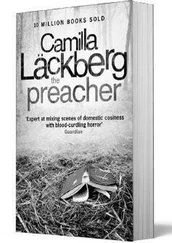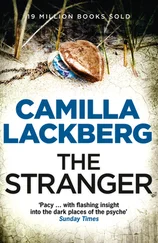The injustice of it all made hot tears well up in her eyes, but Linda forced them back as she had so many times before. She did not intend to give Jacob the satisfaction of seeing her tears or allow him another opportunity to act as saviour of the world. She knew that his fingers itched to get her life onto the right path, but she would rather die than be a doormat like him. Nice girls might get to Heaven, but she intended to go much, much farther than that. She would rather come down to earth with a crash of thunder than live her life a milksop like her big brother, secure as he was that everyone loved him.
‘Do you have any plans today? I could use a little help around the house,’ said Marita.
She was buttering several slices of bread for the children as she directed her question to Linda. She was a motherly woman, slightly overweight and with a plain face. Linda had always thought that Jacob could have done better. An image of her brother and her sister-in-law in bed popped into her mind. She was sure that they did it dutifully once a month, with the lights off and her sister-in-law wearing some concealing, ankle-length nightgown. The image made her giggle, and the others gave her a quizzical look.
‘Hey, Marita asked you a question. Can you help her around the house today? This isn’t a boarding-house, you know.’
‘All right, all right, I heard her the first time. You don’t have to nag. And no, I can’t help out today. I have to …’ She searched for a good excuse. ‘I have to check on Scirocco. He was limping a little yesterday.’
Her excuse was received with sceptical looks, and Linda put on her most contentious expression, ready for a fight. But to her astonishment no one felt like challenging her today, despite the obvious lie. The victory – and yet another day of loafing – was hers.
The desire to go outside and stand in the rain, with his face turned up to the sky and the water streaming over him, was irresistible. But there were certain things that an adult could not permit himself, especially if he was at work, and Martin had to restrain his childish impulse. But it was wonderful. All the oppressive heat that had held them captive the past two months was flushed away in one good downpour. Through the open window he could smell the rain in his nostrils. Rain came splashing onto the part of his desk closest to the window, but he had moved all the papers so it didn’t matter. It was worth it to be able to smell the cool air.
Patrik had called in to say that he’d overslept, so Martin had been the first one in for a change. The mood at the station had been low after yesterday’s revelation of Ernst’s serious misjudgement, so it was nice to be able to sit here in peace and quiet and collect his thoughts surrounding the latest developments. He did not envy Patrik the task of notifying the woman’s relatives, but even he knew that learning the facts was the first step in the healing process of grief. They probably didn’t even know that she was missing, so the news would come as a shock. Now the most important thing was to locate the family, and that was one of Martin’s tasks for the day: to contact his German colleagues. He hoped he’d be able to talk to them in English, otherwise he’d have a problem. He remembered enough school German that he didn’t regard Patrik’s German as much of an asset, after hearing his colleague stammer through the conversation with Tanja’s friend.
He was just about to pick up the receiver and dial Germany when the phone rang. His pulse sped up when he heard that it was Forensics in Göteborg, and he reached for his notepad covered in scribbles. Actually the person on the line was supposed to report to Patrik, but since he hadn’t come in yet Martin would have to do.
‘Things certainly seem to be heating up out there in the sticks.’
Forensic doctor Tord Pedersen was referring to the autopsy he had done a year and a half ago on Alex Wijkner, which led to one of the very few homicide investigations that Tanumshede police station had ever conducted.
‘Yep, we’re starting to wonder whether it’s something in the water. Pretty soon we’ll be catching up with Stockholm in the murder statistics.’
The light, bantering tone was a way for them – and many other professionals who often came in contact with death and misfortune – to handle the pressures of their daily work. It was not meant to detract from the gravity of their profession.
‘Have you already finished with the autopsy? I thought people were killing each other faster than ever in this heat we’ve been having,’ Martin went on.
‘Well, you’re actually right about that. We can tell that people have a shorter fuse because of the heat, but things have actually slowed down the past few days. So we were able to get to your case sooner than we thought.’
‘Let’s hear it.’ Martin held his breath. Much of the progress of an investigation depended on how much Forensics had to offer.
‘Well, it’s clear that you’re not dealing with a pleasant fellow. The cause of death was easy to determine: she was strangled. But it’s what was done to her before she died that’s really remarkable.’
Pedersen paused, and Martin pictured him putting on a pair of glasses.
‘Yes?’ Martin couldn’t hide his impatience.
‘Now let’s see … You’ll be getting this by fax as well … Hmm,’ said Pedersen, apparently skimming the report. Martin’s hand began to sweat from his tight grip on the receiver.
‘Yes, here it is. Fourteen fractures to various parts of the skeleton. All inflicted before death, judging from the varying degrees of healing that had taken place.’
‘You mean –’
‘I mean that somebody broke her arms, legs, fingers, and toes over the course of about a week, I would reckon.’
‘Were they broken on a single occasion or on several? Can you tell that?’
‘As I said, we can see that the fractures show a varying degree of healing, so my professional opinion is that they occurred sporadically over the entire period. I’ve made a sketch of the order in which I think the fractures occurred. It’s included in the report I faxed to you. The victim also had a good number of superficial incisions on her body. Also in varying stages of healing.’
‘Good God!’ Martin couldn’t help blurting out.
‘I’m inclined to agree with that opinion.’ Pedersen’s voice sounded dry over the telephone. ‘The pain she experienced must have been unbearable.’
For a moment they contemplated in silence how cruel people could be. Then Martin pulled himself together and continued, ‘Did you find any evidence on the body that might help us?’
‘Yes, we found semen. If you find a suspect, he could be tied to the murder with DNA. Naturally we’re searching our database as well, but it’s rare that we get any hits that way. So far, the register is just too small. We can only dream of the day when we’ll have the DNA of every citizen in a searchable database. Then we’ll be in a totally different position.’
‘Dream is probably the right word. Complaints about infringing on the freedom of the individual and all that will probably stop that plan cold.’
‘If what this woman went through can’t be called restricting an individual’s freedom, then I don’t know what can …’
This was uncharacteristically philosophical for the normally prosaic Tord Pedersen. Martin realized that for once he had actually been moved by the victim’s fate. This was usually not something a pathologist could allow if he wanted to sleep well at night.
‘Can you give me an estimated time of death?’
‘Yes, I got the results from the samples that the techs took on-site, and then I supplemented them with my own observations, so I can give you quite a reliable time interval.’
Читать дальше












